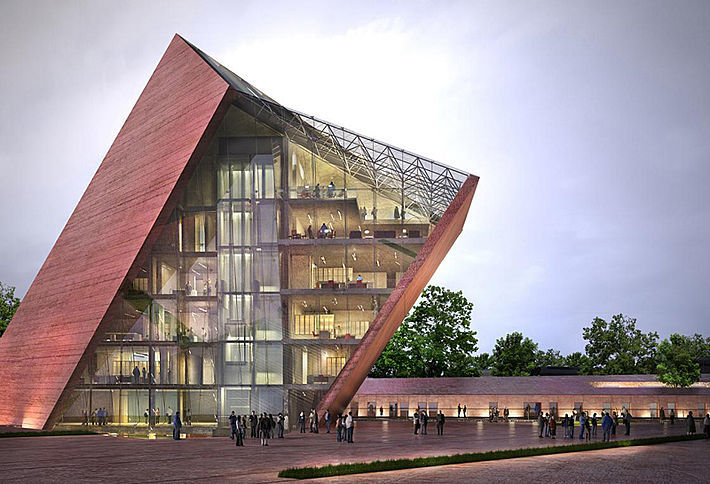Politics
Controversial Decision Enables Change of Museum’s Focus to One of Polish Suffering
The conservative government is forcing the museum to merge with one dedicated to 'heroic Polish self-defense.'

The conservative government is forcing the museum to merge with one dedicated to 'heroic Polish self-defense.'

Alyssa Buffenstein

The Polish Supreme Administrative Court has rejected a proposal to suspend the merger of the barely-finished Museum of the Second World War in Gdansk with a museum dedicated to the first Polish battle of the war.
The decision, which was made on January 24, effectively allows the Polish government to change the focus of the museum from one that has a broader view on World War II to one that is exclusively dedicated to “Polish suffering and military heroism.” Jaroslaw Kaczynski, the leader of the ruling right-wing Law and Justice Party, has for years vowed he would make this change.
The World War II museum, led by director Pawel Machcewicz, offered a preview for journalists and historians on Monday, January 23, ahead of the court ruling, and many reports from the event speculated on whether the museum will ever open to the public in that form.
“This is very bad,” Machcewicz said of the court decision. “This ruling means that the Museum of the Second World War will be liquidated on the last day of January. It means that I will be gone and that the new director can try to change the exhibition or delay the opening.”
The museum has been in the works since 2008. It relies on government funding, and was set to focus on the civilian experience of the war from an international perspective, emphasizing Eastern and Central Europe. Between its conception and today, however, the Polish government has undergone a major shift to the right, now dominated by the conservative-national, Christian-democratic Law and Justice Party.
The current culture minister Piotr Glinski maintains a critical stance on the museum, and has been pushing for a merger with a museum that currently exists only on paper, and is dedicated to the Battle of Westerplatte. In November 2016, the New York Times quoted Glinski saying that focusing on the September 1939 battle would better represent “heroic Polish self-defense,” and that the museum in the works failed to put “enough stress on the Polish point of view.”
“We should do something like what the Jewish community has done, which managed to arrange around the Holocaust all the other events of World War II,” said historian Jan Zaryn, a senator for the Law and Justice party, on Polish TV in October, according to VOA News.
Meanwhile, the merger has been opposed by historians like the British Norman Davies, who chairs the museum’s advisory board.
“It’s a part of the present government’s attempt to rewrite history…It’s one of the pillars of every authoritarian or totalitarian regime, that they want to reorder the past to their own fantasies,” he told the NYT.
In an attempt to block the merger—which was filed by Glinski on September 6, 2016 and itself still awaits approval by Polish court—the Office of the Commissioner for Human Rights filed a complaint on October 20, which was rejected yesterday.
Between the preview on Monday and a public opening this weekend, expected to draw 2,000 visitors, the institution’s future remains unclear, besides that it will lie in the hands of the culture ministry.
According to The Art Newspaper, the ministry has released a statement rejecting the idea that the merger is “synonymous” with the dissolution of the Second World War Museum, or that it would “limit the scope of the permanent exhibition.” The date of the merger has been postponed, the ministry said, “to allow the construction and installation to conclude.”